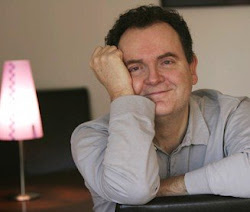The French referendum on the European constitution is going to take place on May 29. Web sites of all kinds are blossoming and offering a large variety of opinions, arguments and styles.
Two facts should make the campaign on the net especially lively:
1) Political stands on the EU constitution don't go along traditional party lines, and within some parties (notably the socialist party), dissidents will use the net to voice their opposition to the Constitution.
2) Those for the NO will have much less access to TV, since the time for official electoral broadcasts will be allocated to parties which have MPs at the French or the European parliaments and, in part, depending on the votes they got at the last European election. De facto, this means a lot of TV time for the YES (advocated by all large French parties), while the NO will be defended on TV only by far left or far right parties (including the National Front).
Here is a first selection of Web sites or blogs on the French referendum. Quite interestingly, it should be noted that the blog format is taking over traditional Web sites, likely because blogs are easier to start and maintain.
(Please let me know of any noteworthy site I may list in subsequent posts).
Le référendum sur la Constitution européenne aura lieu le 20 mai prochain. Les sites se multiplient pour défendre le oui ou le non, Beaucoup sont (très) sérieux, certains s'essaient à des approches plus amusantes.
Deux éléments devraient conduire à une utilisation plus intensive du net lors de la campagne.
1) Les camps en faveur du Oui et du Non ne correspondent pas aux clivages partisans traditionnels, et à l'intérieur de certains partis, notamment le PS, les partisans du Non devront utiliser le net pour faire entendre leur voix.
2) Le camp du OUI sera sur-représenté lors de la campagne télévisée, puisque seuls les partis ayant des élus aux Parlements français ou européen disposeront d'un temps d'antenne (10 minutes chacun, le reste étant réparti en fonction des résultats obtenus à la dernière élection européenne).
Voici une première sélection de sites Web ou blogs. On peut noter que les blogs, plus faciles à créer et à gérer, l’emportent sur les sites Web traditionnels.
Merci de m'indiquer les sites intéressants que vous repérez. Je les citerai dans un prochain post.
Serious category/ Catégorie sérieux:
http://www.lesamisduoui.com/ (YES)
http://www.ensemblepourleoui.fr/ (YES)
http://www.constitution-europeenne.info/(YES)
http://www.appeldes200.net/ (NO)
http://reseau.over-blog.com (NO)
http://www.france.attac.org/(NO)
Dissident Socialists category / Catégorie des socialistes dissidents (NON)
http://www.pourmoicestnon.com/
http://www.nonsocialiste.fr/
http://www.ambitioneurope.org/
Trans-European sites category/ Catégorie sites transeuropéens:
http://yes-campaign.net (YES)
http://www.euractiv.com (Institutional)
http://www.yesbut.org/en/ (YES BUT)
Quizz on the European constitution / 25 questions sur la constitution (NON)
http://www.attacparis12.lautre.net/tmp/bazar/quiz.html
Kind of funny category /Tendance humoristique
Belles histoires d'Europe (YES!)
http://www.la-gauche.org/ (NO!)
http://www.yesbutnau.com/ (YES BUT NAU)
NO posters and stickers to download/ Affiches et stickers pour le NON:
http://www.lateliergraphique.org/visuels.php
mercredi 23 mars 2005
Yes, yes but, no, no but: the French EU referendum on the net
jeudi 17 mars 2005
News management, propaganda and public information
ABC News had a gripping story yesterday March 16th: Government Blurring the Line on News? It was about Bush administration sending video news relases to TV stations accross the country. These video news releases are designed and packaged as other segments in the news and some stations - mostly local - did broadcast them without no indication they have been produced by the government.
As an example, ABC News cited the case of "a report about the president's controversial education bill which was presented as news on many local stations including those in Houston and Washington and ended with the words: This is a program that gets an A-plus. In Washington, Karen Ryan reporting." . But, as ABC News point outs, Karen Ryan is not a reporter. She works in public relations and was hired by the Bush administration to voice the government-produced news stories.
While the government sees this pratice as "the legitimate provision of information concerning the programs administered by public agencies", the Government Accountability Office, which is the investigative arm of Congress, considers that, in many cases, this amounts to "covert propaganda", especially when there is no clear mention of the source.
News management, as public relations specialists and spin doctors call it, is not something that the Bush administration invented. It has been commonplace in many governments for one decade, notably Clinton's and Blair's. In France too, we have some attempts to news management, especially from the part of younger ministers (e.g. Nicolas Sarkozy) who have been politically socialized in a TV environment. Yet, compared to the US and the UK, news management remains somewhat amateur in France .
News management encompasses a set of techniques - setting the agenda, managing expectations, arranging photo opportunities, embedding journalists in government operations, providing easy access to data or video footage, etc. - which all aims at controlling how the media cover a specific issue. That governements and political organization seek to frame issues should not come as a surprise. What is more unfortunate is that so few journalists do resist such strategies.
Thèmes : News management
samedi 12 mars 2005
French capitalist reuses May 68 anticapitalist posters
An interesting debate is taking place on several French blogs (see especially the post by Hervé Le Crosnier on Framasoft : Une campagne publicitaire qui empiète sur le droit moral et les biens communs de la culture) about Leclerc (a large retail stores chain)* using May 1968 posters for its own corporate communication.
One intriguing aspect of the Leclerc advertising campaign is the statement by the Company CEO that the copyrights of the May 1968 posters had been registered by someone and that Leclerc bought them (in Les Echos, 1er mars 2005, p. 19). So far, most people believed that the posters were the collective creation of the Atelier populaire.
Besides the debate on how to protect "collective intellectual property rights" (an innovating, yet tricky, concept which is being explored through Common creative licences), Leclerc hijacking of May 68 posters has given rise to some fascinating cultural jamming.
Here are some examples:
- Leclerc, maréchal des logis.
- Rispotons à Leclerc.
- Le détourneur détourné.
(*) To know more about Leclerc and the likes, you may want to read Les coulisses de la grande distribution (the back office of large retail stores) by Christian Jacquiau (Albin Michel publisher, 2000).
vendredi 11 mars 2005
Oxford politics - Animals vs bikers rights
There are many bikers in Oxford. In this mostly flat city, using a bike is the quickest and cheapest way to go from one point to another. Yet, the City Council does not seem eager to meet bikers needs. There are not enough bikes racks, bikes lanes do not form a coherent system. That City officials do not care about bikers is quite logical: a majority of them are students who are not permanent residents and do not vote in the city.
By contrast, animal rights activists are much more powerful and for several months now, they have been able to stop the building of a new research center (in which they claim animals experiments were to take place).
As Lenin would put it: if you want to change things, you do not need to be many, but well organized and determined.
mardi 8 mars 2005
La courte vie des blogs
Beaucoup de blogs naissent chaque jour; beaucoup meurent aussi. La contrainte d'avoir à écrire chaque jour, ou en tout cas assez souvent, quelque chose, et si possible quelque chose d'un peu intéressant, est terrible.
En plus on s'aperçoit vite qu'on est peu lu. Quelques dizaines de visiteurs au mieux, jamais les mêmes (ce qui suggère qu'ils sont arrivés là par hasard - notamment grâce à la fonction Next Blog de blogger; intuition vite confirmée par l'analyse des sites d'où viennent ces visiteurs).
Bref, alors qu'on avait tant à dire à l'humanité réseautante, on se rend compte qu'on est qu'une petite goutte d'encre dans un immense océan d'octets.
Parmi les blogs qui mettent la clé sous la porte, il y a aujourd'hui Locust St.. Comme les autres bloggueurs, son auteur est un peu fatigué. mais il a aussi une autre raison: il a remarqué que, parmi les visiteurs assidus de son blog, figurait quelqu'un d'un cabinet d'avocats spécialisé en propriété intellectuelle. Alors Locus St. a décidé d'interrompre sa remarquable chronique du jazz des années 1940.
Parano? Peut-être un peu, mais peut-être pas tant que ça...
Bye Bye Locus St.
vendredi 4 mars 2005
An idea for Mr and Ms Bill Gates
The king of computer software Bill Gates has received an honorary knighthood from the Queen, as the BBC news web site put it.
This is to honour the action of the Bill and Melinda Gates Foundation that has hugely invested in research for an Aids vaccine and is currently working on a global health programme in the developing world. The Foundation is also "committed to raising the high school graduation rate and helping all students—regardless of race or family income—graduate as strong citizens ready for college and work" and has established a scholarship scheme to enable the brightest students to go to Cambridge University.
At some point in the day, Melinda Gates said on TV that "the world would be much better if people gave their money away".
This is a very accurate statement.
So, may I suggest an idea to Bill and Melinda?
Since there is a widespread concern about Microsoft's dominant position in software, why Bill and Melinda would not give away their company to the rest of the world?
I even have an idea about how we could manage this so that Bill (and Melinda) get rewarded for all the work they have accomplished. In each country of the planet, an users association would be established to buy the shares of the Microsoft company (for instance in proportion to its population). Thanks to this scheme, Microsoft would become the people company. And Bill and Melinda, being much richer, could give away more money to the developing countries.
%40claire+Garate+-+Copie.jpg)



